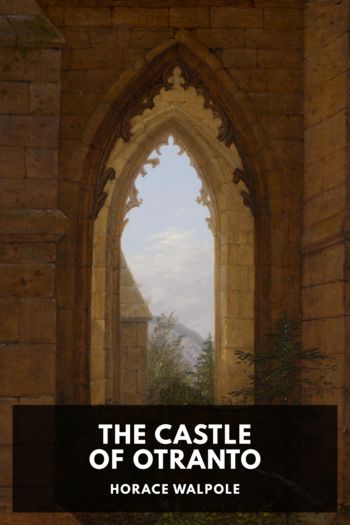The Castle of Otranto Horace Walpole (best free ereader .TXT) 📖

- Author: Horace Walpole
Book online «The Castle of Otranto Horace Walpole (best free ereader .TXT) 📖». Author Horace Walpole
“Thou traitor Prince! Isabella shall be found.”
Manfred endeavoured to hold him, but the other knights assisting their comrade, he broke from the Prince, and hastened into the court, demanding his attendants. Manfred, finding it vain to divert him from the pursuit, offered to accompany him and summoning his attendants, and taking Jerome and some of the friars to guide them, they issued from the castle; Manfred privately giving orders to have the knight’s company secured, while to the knight he affected to despatch a messenger to require their assistance.
The company had no sooner quitted the castle than Matilda, who felt herself deeply interested for the young peasant, since she had seen him condemned to death in the hall, and whose thoughts had been taken up with concerting measures to save him, was informed by some of the female attendants that Manfred had despatched all his men various ways in pursuit of Isabella. He had in his hurry given this order in general terms, not meaning to extend it to the guard he had set upon Theodore, but forgetting it. The domestics, officious to obey so peremptory a Prince, and urged by their own curiosity and love of novelty to join in any precipitate chase, had to a man left the castle. Matilda disengaged herself from her women, stole up to the black tower, and unbolting the door, presented herself to the astonished Theodore.
“Young man,” said she, “though filial duty and womanly modesty condemn the step I am taking, yet holy charity, surmounting all other ties, justifies this act. Fly; the doors of thy prison are open: my father and his domestics are absent; but they may soon return. Be gone in safety; and may the angels of heaven direct thy course!”
“Thou art surely one of those angels!” said the enraptured Theodore: “none but a blessed saint could speak, could act—could look—like thee. May I not know the name of my divine protectress? Methought thou namedst thy father. Is it possible? Can Manfred’s blood feel holy pity! Lovely Lady, thou answerest not. But how art thou here thyself? Why dost thou neglect thy own safety, and waste a thought on a wretch like Theodore? Let us fly together: the life thou bestowest shall be dedicated to thy defence.”
“Alas! thou mistakest,” said Matilda, signing: “I am Manfred’s daughter, but no dangers await me.”
“Amazement!” said Theodore; “but last night I blessed myself for yielding thee the service thy gracious compassion so charitably returns me now.”
“Still thou art in an error,” said the Princess; “but this is no time for explanation. Fly, virtuous youth, while it is in my power to save thee: should my father return, thou and I both should indeed have cause to tremble.”
“How!” said Theodore; “thinkest thou, charming maid, that I will accept of life at the hazard of aught calamitous to thee? Better I endured a thousand deaths.”
“I run no risk,” said Matilda, “but by thy delay. Depart; it cannot be known that I have assisted thy flight.”
“Swear by the saints above,” said Theodore, “that thou canst not be suspected; else here I vow to await whatever can befall me.”
“Oh! thou art too generous,” said Matilda; “but rest assured that no suspicion can alight on me.”
“Give me thy beauteous hand in token that thou dost not deceive me,” said Theodore; “and let me bathe it with the warm tears of gratitude.”
“Forbear!” said the Princess; “this must not be.”
“Alas!” said Theodore, “I have never known but calamity until this hour—perhaps shall never know other fortune again: suffer the chaste raptures of holy gratitude: ’tis my soul would print its effusions on thy hand.”
“Forbear, and be gone,” said Matilda. “How would Isabella approve of seeing thee at my feet?”
“Who is Isabella?” said the young man with surprise.
“Ah, me! I fear,” said the Princess, “I am serving a deceitful one. Hast thou forgot thy curiosity this morning?”
“Thy looks, thy actions, all thy beauteous self seem an emanation of divinity,” said Theodore; “but thy words are dark and mysterious. Speak, Lady; speak to thy servant’s comprehension.”
“Thou understandest but too well!” said Matilda; “but once more I command thee to be gone: thy blood, which I may preserve, will be on my head, if I waste the time in vain discourse.”
“I go, Lady,” said Theodore, “because it is thy will, and because I would not bring the grey hairs of my father with sorrow to the grave. Say but, adored Lady, that I have thy gentle pity.”
“Stay,” said Matilda; “I will conduct thee to the subterraneous vault by which Isabella escaped; it will lead thee to the church of St. Nicholas, where thou mayst take sanctuary.”
“What!” said Theodore, “was it another, and not thy lovely self that I assisted to find the subterraneous passage?”
“It was,” said Matilda; “but ask no more; I tremble to see thee still abide here; fly to the sanctuary.”
“To sanctuary,” said Theodore; “no, Princess; sanctuaries are





Comments (0)